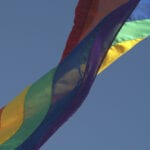

Lebanese drag performer Aniss Ezzeddine had been drug-free for seven months. But when a massive chemical explosion wrecked his hometown Beirut, all he wanted was to get high.
Ezzeddine bought some crystal meth, desperate to blot out the thought that he could have died if he had been on time for a meeting in a neighbourhood that was decimated by the blast – including friends’ homes and venues where he had performed.
“I needed to let off steam after seeing friends killed and injured,” the 25-year-old, who wears a red sequined dress with waist-length blonde hair when performing as Anissa Krana, told the Thomson Reuters Foundation.
“I had been very proud to be clean, but when the explosion happened, I got back on drugs immediately.”
The blast that rocked the port last August, blamed on a huge quantity of poorly stored chemicals, killed more than 200 people, wounded thousands and left countless more with the hidden scars of trauma.
It wiped out bars, clubs and cafes that were a lifeline for the LGBTQ+ community in Beirut, which is one of the most liberal cities in the Middle East although people having “sexual intercourse against nature” face up to a year in jail.
One year on, health officials are warning of a spike in risky behaviour including drug use, sex work and “chemsex” – where mainly gay and bisexual men take drugs such as crystal meth or GHB to enhance sex, often unprotected.
Ezzeddine estimated that chronic drug use has increased from less than half to about two-thirds of his LGBTQ+ community since the blast, which has deepened Lebanon’s political and economic collapse, along with the coronavirus pandemic.
“Most of these people hooked on drugs don’t care about anything anymore,” said Ezzeddine, adding that he had lost friends when they “got sucked into the chemsex community”.
“They know it’s affecting them in a bad way but they say, ‘Give me a different solution to fix my life. I’m stuck with no work, no life, a family that fights me and a state that is against me.”
At least 70% of LGBTQ+ people in Lebanon have lost jobs in the last year and 75% have seen their mental health deteriorate significantly, according to a June survey by the British charity Oxfam.
“People need more drugs to cope with all the craziness and get through the weekend,” said Ismael Maatouk of the National AIDS Control Program, who has worked with the LGBTQ+ community for eight years.
“They try to escape reality and one of the side effects is lack of control of sexual behaviour,” said Maatouk, a Sexually Transmitted Infections specialist, noting others in the community had turned to sex work to make ends meet.
View this post on Instagram
The post Spike in ‘chemsex’ among Lebanon’s LGBTQ+ community, broken by Beirut blast appeared first on GAY TIMES.
Spike in ‘chemsex’ among Lebanon’s LGBTQ+ community, broken by Beirut blast

Lebanese drag performer Aniss Ezzeddine had been drug-free for seven months. But when a massive chemical explosion wrecked his hometown Beirut, all he wanted was to get high.
Ezzeddine bought some crystal meth, desperate to blot out the thought that he could have died if he had been on time for a meeting in a neighbourhood that was decimated by the blast – including friends’ homes and venues where he had performed.
“I needed to let off steam after seeing friends killed and injured,” the 25-year-old, who wears a red sequined dress with waist-length blonde hair when performing as Anissa Krana, told the Thomson Reuters Foundation.
“I had been very proud to be clean, but when the explosion happened, I got back on drugs immediately.”
The blast that rocked the port last August, blamed on a huge quantity of poorly stored chemicals, killed more than 200 people, wounded thousands and left countless more with the hidden scars of trauma.
It wiped out bars, clubs and cafes that were a lifeline for the LGBTQ+ community in Beirut, which is one of the most liberal cities in the Middle East although people having “sexual intercourse against nature” face up to a year in jail.
One year on, health officials are warning of a spike in risky behaviour including drug use, sex work and “chemsex” – where mainly gay and bisexual men take drugs such as crystal meth or GHB to enhance sex, often unprotected.
Ezzeddine estimated that chronic drug use has increased from less than half to about two-thirds of his LGBTQ+ community since the blast, which has deepened Lebanon’s political and economic collapse, along with the coronavirus pandemic.
“Most of these people hooked on drugs don’t care about anything anymore,” said Ezzeddine, adding that he had lost friends when they “got sucked into the chemsex community”.
“They know it’s affecting them in a bad way but they say, ‘Give me a different solution to fix my life. I’m stuck with no work, no life, a family that fights me and a state that is against me.”
At least 70% of LGBTQ+ people in Lebanon have lost jobs in the last year and 75% have seen their mental health deteriorate significantly, according to a June survey by the British charity Oxfam.
“People need more drugs to cope with all the craziness and get through the weekend,” said Ismael Maatouk of the National AIDS Control Program, who has worked with the LGBTQ+ community for eight years.
“They try to escape reality and one of the side effects is lack of control of sexual behaviour,” said Maatouk, a Sexually Transmitted Infections specialist, noting others in the community had turned to sex work to make ends meet.
View this post on Instagram
The post Spike in ‘chemsex’ among Lebanon’s LGBTQ+ community, broken by Beirut blast appeared first on GAY TIMES.


Post a Comment